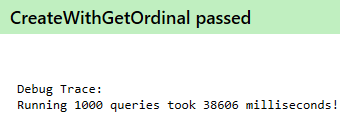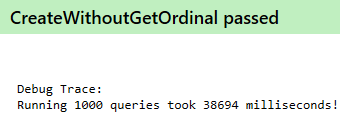The impact of SqlDataReader.GetOrdinal on performance
I recently had a discussion about the impact of SqlDataReader.GetOrdinal on execution of a SqlClient.SqlCommand. I then decided to run some code to measure the difference, because I think that’s the only way to get a decent opinion. This is the code that I’ve used to run a certain query 1000 times:
private void InvokeQuery(Action mapObject)
{
Stopwatch stopwatch = Stopwatch.StartNew();
for (int i = 0; i < Iterations; i++)
{
using (var sqlCommand = new SqlCommand(this._query, this._sqlConnection))
{
using (SqlDataReader sqlDataReader = sqlCommand.ExecuteReader())
{
while (sqlDataReader.NextResult())
{
mapObject(sqlDataReader);
}
}
}
}
stopwatch.Stop();
Debug.WriteLine("Running {0} queries took {1} milliseconds!", Iterations, stopwatch.ElapsedMilliseconds);
}
mapObject uses either directly the ordinal, or fetches the ordinal based on the column name. Also, I moved everything inside of the for loop to ensure nothing could be reused between queries. Here are the mapObject Actions, with GetOrdinal:
Action<SqlDataReader> = sqlDataReader =>
{
int salesOrderID = sqlDataReader.GetOrdinal("SalesOrderID");
int revisionNumber = sqlDataReader.GetOrdinal("RevisionNumber");
int orderDate = sqlDataReader.GetOrdinal("OrderDate");
int dueDate = sqlDataReader.GetOrdinal("DueDate");
int shipDate = sqlDataReader.GetOrdinal("ShipDate");
int status = sqlDataReader.GetOrdinal("Status");
int onlineOrderFlag = sqlDataReader.GetOrdinal("OnlineOrderFlag");
int salesOrderNumber = sqlDataReader.GetOrdinal("SalesOrderNumber");
int purchaseOrderNumber = sqlDataReader.GetOrdinal("PurchaseOrderNumber");
int accountNumber = sqlDataReader.GetOrdinal("AccountNumber");
int customerID = sqlDataReader.GetOrdinal("CustomerID");
int salesPersonID = sqlDataReader.GetOrdinal("SalesPersonID");
int territoryID = sqlDataReader.GetOrdinal("TerritoryID");
int billToAddressID = sqlDataReader.GetOrdinal("BillToAddressID");
int shipToAddressID = sqlDataReader.GetOrdinal("ShipToAddressID");
int shipMethodID = sqlDataReader.GetOrdinal("ShipMethodID");
int creditCardID = sqlDataReader.GetOrdinal("CreditCardID");
int creditCardApprovalCode = sqlDataReader.GetOrdinal("CreditCardApprovalCode");
int currencyRateID = sqlDataReader.GetOrdinal("CurrencyRateID");
int subTotal = sqlDataReader.GetOrdinal("SubTotal");
int taxAmt = sqlDataReader.GetOrdinal("TaxAmt");
int freight = sqlDataReader.GetOrdinal("Freight");
int totalDue = sqlDataReader.GetOrdinal("TotalDue");
int comment = sqlDataReader.GetOrdinal("Comment");
int rowguid = sqlDataReader.GetOrdinal("rowguid");
int modifiedDate = sqlDataReader.GetOrdinal("ModifiedDate");
var temp = new SalesOrderHeader(
salesOrderID: sqlDataReader.GetInt32(salesOrderID),
revisionNumber: sqlDataReader.GetInt16(revisionNumber),
orderDate: sqlDataReader.GetDateTime(orderDate),
dueDate: sqlDataReader.GetDateTime(dueDate),
shipDate: sqlDataReader.GetDateTime(shipDate),
status: sqlDataReader.GetInt16(status),
onlineOrderFlag: sqlDataReader.GetBoolean(onlineOrderFlag),
salesOrderNumber: sqlDataReader.GetString(salesOrderNumber),
purchaseOrderNumber: sqlDataReader.GetString(purchaseOrderNumber),
accountNumber: sqlDataReader.GetString(accountNumber),
customerID: sqlDataReader.GetInt32(customerID),
salesPersonID: sqlDataReader.GetInt32(salesPersonID),
territoryID: sqlDataReader.GetInt32(territoryID),
billToAddressID: sqlDataReader.GetInt32(billToAddressID),
shipToAddressID: sqlDataReader.GetInt32(shipToAddressID),
shipMethodID: sqlDataReader.GetInt32(shipMethodID),
creditCardID: sqlDataReader.GetInt32(creditCardID),
creditCardApprovalCode: sqlDataReader.GetString(creditCardApprovalCode),
currencyRateID: sqlDataReader.GetInt32(currencyRateID),
subTotal: sqlDataReader.GetDecimal(subTotal),
taxAmt: sqlDataReader.GetDecimal(taxAmt),
freight: sqlDataReader.GetDecimal(freight),
totalDue: sqlDataReader.GetDecimal(totalDue),
comment: sqlDataReader.GetString(comment),
rowguid: sqlDataReader.GetGuid(rowguid),
modifiedDate: sqlDataReader.GetDateTime(modifiedDate)
);
};
And without GetOrdinal:
Action<SqlDataReader> mapSalesOrderHeader = sqlDataReader =>
{
new SalesOrderHeader(
salesOrderID: sqlDataReader.GetInt32(0),
revisionNumber: sqlDataReader.GetInt16(1),
orderDate: sqlDataReader.GetDateTime(2),
dueDate: sqlDataReader.GetDateTime(3),
shipDate: sqlDataReader.GetDateTime(4),
status: sqlDataReader.GetInt16(5),
onlineOrderFlag: sqlDataReader.GetBoolean(6),
salesOrderNumber: sqlDataReader.GetString(7),
purchaseOrderNumber: sqlDataReader.GetString(8),
accountNumber: sqlDataReader.GetString(9),
customerID: sqlDataReader.GetInt32(10),
salesPersonID: sqlDataReader.GetInt32(11),
territoryID: sqlDataReader.GetInt32(12),
billToAddressID: sqlDataReader.GetInt32(13),
shipToAddressID: sqlDataReader.GetInt32(14),
shipMethodID: sqlDataReader.GetInt32(15),
creditCardID: sqlDataReader.GetInt32(16),
creditCardApprovalCode: sqlDataReader.GetString(17),
currencyRateID: sqlDataReader.GetInt32(18),
subTotal: sqlDataReader.GetDecimal(19),
taxAmt: sqlDataReader.GetDecimal(20),
freight: sqlDataReader.GetDecimal(21),
totalDue: sqlDataReader.GetDecimal(22),
comment: sqlDataReader.GetString(23),
rowguid: sqlDataReader.GetGuid(24),
modifiedDate: sqlDataReader.GetDateTime(25));
};
With GetOrdinal the results are:

And without:

As you can see the performance difference is so low that I honestly don’t think you should sacrifice the readability and maintainability of your code vs a mere 82 milliseconds on a 1000 queries. Readability speaks for itself, you don’t talk with ints anymore, and for maintainability, consider the following: If your query column(s) change and you forget to update your code, GetOrdinal will throw an IndexOutOfRangeException, instead of maybe get an InvalidCastException or, if you’re really unlucky, another column and then broken code behavior… One sidenote to add:
GetOrdinalperforms a case-sensitive lookup first. If it fails, a second, case-insensitive search occurs (a case-insensitive comparison is done using the database collation). Unexpected results can occur when comparisons are affected by culture-specific casing rules. For example, in Turkish, the following example yields the wrong results because the file system in Turkish does not use linguistic casing rules for the letter ‘i’ in “file”. The method throws anIndexOutOfRangeexception if the zero-based column ordinal is not found.
So do watch out that case.
PS: the project itself is hosted on GitHub, you can find it here!